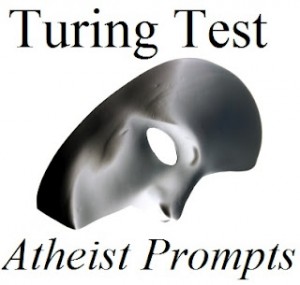This is the second entry in the Atheism round of the 2012 Ideological Turing Test for Religion. In this round, the honest answers of atheists are mixed in with Christians’ best efforts to talk like atheists. It’s your job to see if you can spot the difference. The voting link appears at the end of the entry, and you can look at all entries in this round here.
When (if ever) have you deferred to your philosophical or theological system over your intuitions?
In many ways, we still live in a Cartesian world. The mind-brain distinction, while not as strong as it once was, still persists in many ways. We intuitively think of ourselves as homunculi, sitting in the Cartesian theatre as we observe the outside world. This worldview permeates our ordinary language, and because of this, folk psychological concepts continue to play an important explanatory role in our everyday discourse. Of course, recent neuroscience is showing folk psychology to be mistake-laden, and deserving of exhaustive scrutiny.
We have illusions of almost complete freedom over our choices, but simultaneously we also have drastically under-informed notions about the causes and effects that help determine our beliefs and behaviors (See Nisbett & DeCamp Wilson 1977). This seriously undercuts our claim to introspection, and also to the desires, beliefs, and intentions we attribute to those around us.
In short, our everyday intuitions about why we and others take action, who and what we are, and our general penchant for agency (Hyperactive agency detection device) are all prone to error. In attempting to better understand the universe, I am constantly shedding my own intuitions and assessing my own biases, fallacies, and evolutionary glitches in favor of a naturalized epistemology.
Are there people whose opinions on morality you trust more than your own? How do you recognize them? How is trusting them different than trusting someone’s opinion on physics?
I generally trust those who study ethics to have better informed opinions, but that doesn’t always translate to better opinions overall. I find it hard to believe that any one moral theory can universally address all moral dilemmas (virtue theory, consequentialism, deontology, etc.), and it seems to me that those who have thought about it more should, in principle, have a better understanding of the strengths and weaknesses of each meta-ethical theory.
I’m quite fond of Aristotle’s concept of eudaimonia, which has also attracted me to another proposal by Owen Flanagan in The Really Hard Problem(2007). He argues for a practice called “eudaimonics”, which is the empirical-normative inquiry into human flourishing, and Flanagan argues that this type of investigation is compatible with (or an extension of) scientific investigation. It draws upon modern cognitive science, modern biology, philosophy, and numerous historical traditions to help us best understand human flourishing’s component parts and the best path to getting there.
If we take that proposition seriously (and I highly suggest reading the book), we might argue that one who has thought about “eudaimonics” a great deal and has done the requisite research should be entrusted to have superior moral opinions.
Can you name any works of art (interpreted pretty broadly: books, music, plays, poetry, mathematical proofs, etc) which really capture the way you see life/fill you with a sense of awe and wonder? You can give a short explanation or just list a few pieces.
There’s so many phenomenal works of art that I could name here, but I’m going to go with a sci-fi classic: Star Trek. (Not exactly a high-brow pick, I know!)
The show embodies much of what I find emotionally appealing about the atheist/humanist worldview, although it doesn’t endorse atheism explicitly. It values exploration and knowledge through science. It emphasizes a common morality found not through divine revelation but through foundational altruistic principles and rational deliberation. It endorses a view of technology that is positive almost without reservation and a view that humanity is not broken or naturally sinful, but an excellent species that continues to improve and grow, and a species that can learn from the mistakes of our past.
Star Trek also captures the essence of what I find to be the best kind of art – pieces which both inspire and improve. Great art helps us sort through moral quandaries, grapple with tough and difficult concepts about ourselves, our relation to others, and the universe as a whole. They also inspire and move us to action, and Star Trek has obviously inspired a great deal of fascination with space exploration, complex philosophical questions, and the discussion of moral quandaries.
Click here to judge this entry, and, once you’ve voted, feel free to speculate and trade theories in the comments or look at other entries in this round.












